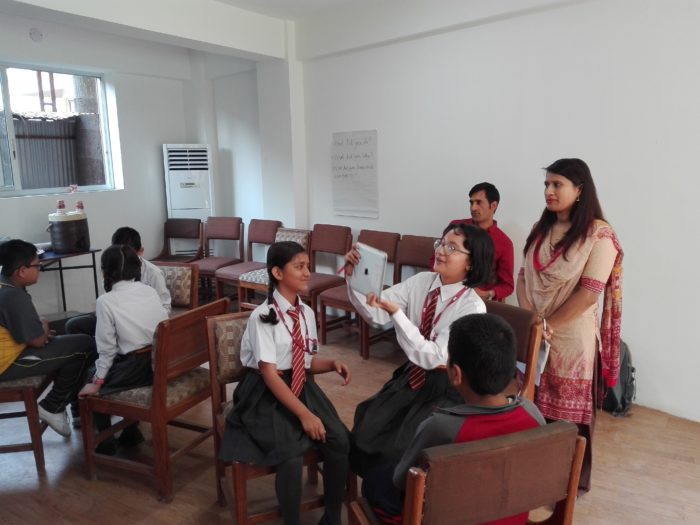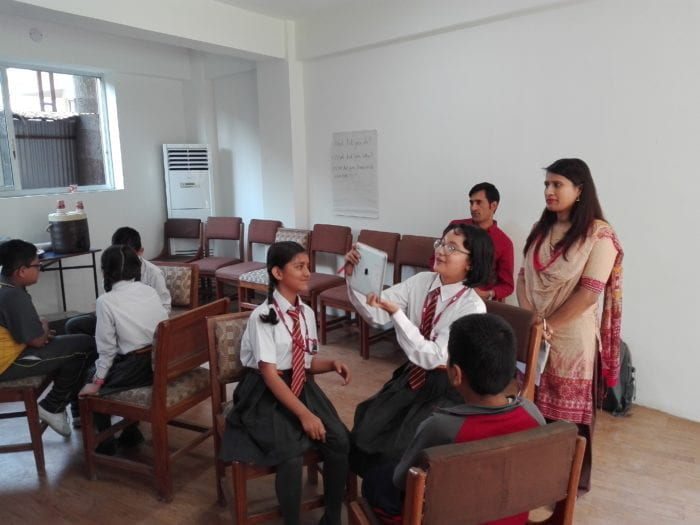Latest posts
- Policy documents: UNICEF Innocenti Discussion Paper on Children and Youth Participation (August 2025) 26 August 2025
- MAP International Online Conference 2025: Session Summaries Report 24 July 2025
- MAP 2025 Conference Highlights: Recordings and Slides 23 July 2025
- Journal article: Reimagining Peace Education in Nepal: Arts-Based, Learner-Centric Pedagogy for Social Justice and Equity 13 July 2025
- Curricula: Mithila art-focused local curriculum in Nepal 2 July 2025
- MAP International Online Conference 2025 1 June 2025
- Policy brief: Gira Ingoma book and policy brief: “The Culture We Want, for the Woman We Want” 28 November 2024
- Manuals and toolkits: GENPEACE Children’s Participation Module in the Development Process 13 November 2024
- Journal article: [Working Paper] Gira Ingoma – One Drum per Girl: The culture we want for the woman we want 30 October 2024
- Curricula: Beyond Tradition: Psychosocial Model 30 October 2024
- Curricula: Beyond Tradition Module: Revitalizing Lenong as a Model for Teaching Betawi Arts 30 October 2024
- Curricula: Beyond Tradition: Lenong Revitalisation as a Model for Teaching Betawi Cultural Arts 30 October 2024
Civil Society Organisations Reflections on Arts Based Methodologies in Schools
23rd March 2020
This post was originally published via Changing the Story (CTS) on 20th December 2019, as part of the CTS sub-project Examining the Interpretations of Civic National Values Made by Young People in Kenya and Nepal.
Changing the Story is an AHRC GCRF project which asks how the arts, heritage and human rights education can support youth-centred approach to civil society building in post-conflict settings across the world. The ‘Examining the Interpretations of Civic National Values Made by Young People in Kenya and Nepal’ was closely linked to the methodologies used in the CTS MAP project, and contributed to Nepal becoming one of MAP’s current country focus. Find out more about Changing the Story and see the original post here: https://changingthestory.leeds.ac.uk
Written By Nub Raj Bhandari (Janaki Women Awareness Society)
Co-I, Examining the Interpretations of Civic National Values Made by Young People in Kenya and Nepal
Project Summary
Two decades of internal conflict and instability in Nepal has brought a drastic reformation in the state structure from central government to federal state including the education system. The school education is divided into two levels: basic (up to 8th grade) and secondary education (9th – 12th grade). Moral education is included in the curriculum of basic education aiming to inform young children about civic national values such as citizenship, social and moral behavior, tolerance and mutual respect. The local government units (LGUs) are responsible for the formation as well as implementation of regulations related to education. Besides the efforts of the central government to reform learning, LGUs, educational institutions and civil society organizations (CSOs) were also seeking opportunities to engage young children in the learning process in post conflict communities. To inform and advance policy making at local (LGUs) and national level on the interpretations of civic national values made by young people, we devised Schemes of Work consisting of reflections-actions-performances-recording and tested them in two schools. The schools and participants were selected randomly from distinct setting: rural/urban, public/private and English medium/Nepali medium. Six young students each from grades six, seven and eight grades, two teachers and two CSOs were selected randomly from each school.
Engagement of CSOs
The selection of CSOs was purposeful. In each school (rural and urban), two CSOs were invited to observe the research process. They overtly observed the engagement of young children and teachers in the arts based methodologies (reflections, actions, performances and recording). Based on a set of open-ended questions, the CSOs provided a reflective overview on the arts based methodologies, overall research process and content.
Reflections of CSOs over the research process
At the planning phase, there were two questions concerning the engagement of CSOs in the research process. The first was ‘whether the CSOs accept arts based engagement of young children as a process of teaching and learning? Similarly, the second question was, ‘how could the engagement of CSOs in the research process add value to the project?’ The reflections from the CSOs showed that their engagement was an essential part of the project. ‘I am wondering, how can I apply these steps in my work?’ was the concern of one CSO participant. While young children were drawing to illustrate their vision of a model community, CSO participants expressed their interest to integrate the activity into their own work at schools. The drawing, according to a CSO, ‘is the best way of engaging students and teachers in the learning and teaching process’. They expressed their interest to learn more about the SOW; ‘I should learn more about the arts based methodologies’, said one urban CSO. Similarly, ‘can we work together on similar project in future’, was the interest of rural CSOs.
According to CSOs, lessons on reflection and performance help young children to learn fast. ‘Everyone is actively participating, so these forms of creative engagement are a better way of engaging young people in the learning processes’ was the common response of CSOs. Though they were watching the actions and performances of young people, they spoke much about engaging adolescents and adults in their community based civic education projects. However, CSO participants know that it is not easy for Nepali CSOs to follow these lessons in their development projects. It could be a challenge to organize multiple opinions of different groups because research is not the common working arena for CSOs in Nepal. Therefore, when they return to their actual work, it could be a challenge for them to integrate the theory of the research they have experienced. However, every opinion made by CSOs in this research project is praiseworthy and it is also a positive indication for the follow up activities based on arts based methodology.

CSO participant observing the research process. Photo credit: Nub Raj Bhandari
Concluding remarks and way forwards
The observations of CSOs throughout the research process from lesson one to four of the SOW’s (reflections, actions, performances and recording), endorse the arts based methodology as a successful research tool to engage people for constructive learning in the post conflict context. CSOs’ keen interest for including the arts based methodologies and SOW in their work could be considered a further step towards sustainability of the process.
With the above reflections, the way forward for future similar projects would be to provide a space for CSOs in the research process to improve their understanding of arts based methodology at a deeper level. This could be done through engaging them in pre-planning meetings, orienting them about the research process well before the fieldwork and engaging them as facilitators as well. CSOs engagement in the pre-planning meeting and orientation will enhance their understanding of the differences between their CSO project and a research project. The facilitation will strengthen them their interest in integrating arts based methodologies in their regular project, which will further support the sustainability of arts based approaches in the post conflict countries.
